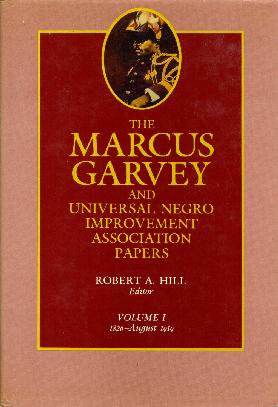Editorial by Marcus Garvey
in the Black Man
[January 1937]
FIGHTING IN ABYSSINIA - THE EMPEROR
RUNS
The poor Abyssinian
native patriots, disorganized and almost helpless, are still fighting against the invading
Italians. These poor people have been left by Haile Selassie to fight out their own
destiny, although pretence is being made that it is the Abyssinian Government that is
doing the fighting. There is no Abyssinian Government in the sense of a recognized
government, but there are scattered bands of Abyssinian patriots who are fighting in
guerilla and other warfare with the hope of saving their country.
It is a pity that there is no real Abyssinian
Napoleon to gather these scattered patriotic units together and conduct a proper camapaign
against the Italian settlers. In the absence of such a leader we can only hope that
the guerilla warfare will continue, such as the Cuban guerilla warfare did,1 until some well organized power is able to go to the
assistance of the patriots to help them to recover their freedom. In the absence of
such benefaction, the patriots of Abyssinia will have to bide their time, when a better
opportunity will present itself to expel the invaders.
Although the Emperor has thrown away the
country and left the people leaderless, there is still hope such as history generally
presents in cases of the kind. Owing to the bad Government organization of Abyssinia
prior to the war, there was no proper or systematic control of the country, so much so
that a large number of the population lived more as bandits and wild men than as
disciplined citizens. This is not creditable when it is considered that Abyssinia is
a great country and had as great an opportunity for civilized progress as any other
country in the world.
There arc some people who think that the
Emperor and his Government should not be harshly criticised, but when it is considered
that the freedom of twelve million people is taken away by the negligence of the governing
authority, no sensible person can exclude such authority from blame if they really think
that the Abyssinians should be free and independent like anyone else. The Negroes of
the world have been very much interested in Abyssinia and are still interested, because
Abyssinia is a Negro Country, even though the Emperor did not think so. As such it
would have been the happiest thing in the world for Negroes to see it rated among the
first-class nations of the world. When the war broke out, we glorified the Emperor,
we defended him, we did everything to encourage him, but he has failed in his trust, and
as the facts reveal themselves to light, we have no other course than to present the truth
to the Negro world. The Emperor was never competent. His incompetence was
shown primarily through his dependence upon other people who were clearly not his friends
to advise him. The result of the advice is that he has been tricked by the League of
Nations and by the European Nations. All in keeping with the desire to give a
European Power a controlling hand in Abyssinia.
If Mussolini had lost a war for Italy, or
should Hitler lose a war for Germany, or Stalin one for Russia, their respective peoples
would not pay them compliments but would send them running. The Kaiser lost the war
for Germany and they sent him into permanent exile.2
The Emperor has lost the Abyssinian battle and he is now in permanent exile in
England, and will only be able to return to Abyssinia, at least Addis Ababa, after he
becomes an Italian citizen. This is bad for him, and also bad for the Abyssinians,
but we must pay all honour to the native patriots who are still doing their best without
the assistance of the Emperor. If they could be reached they are the ones to be
helped. Sooner or later we will have to reach them, but not in the way some people
expect it can be done at the present time - through the agency of the Emperor. He
has no more control over the fighting patriots than Mussolini has. In fact,
Mussolini has more, because he is on the spot. The Emperor is thousands of miles
away, hiding. In truth he doesn't know what is going on.
Printed in BM 2 no. 5 (January 1937): 1-2.
1. Garvey is referring to the protracted struggle of Cuban revolutionaries to
gain independence from Spain. A large-scale rebellion broke out in 1868 that lasted
for ten years; Spain only managed to defeat the revolutionaries due to Cuban dissension
over the institution of slavery. A second rebellion broke out in 1895; the United
States entered the war on the side of the Cuban rebels in 1898. American
intervention swiftly decided the war, and Spain relinquished title to the island in the
Treaty of Paris, signed in December 1898. Though formal political independence was
attained, Cuba remained under military occupation by U.S. forces, and American influence
remained predominant long thereafter (Franklin W. Knight, The Caribbean: The Genesis of
a Fragmented Nationalism [New York: Oxford University Press, 1978], p. 170).
2.
In early November 1918, faced with growing revolutionary unrest, Kaiser Wilhelm II
of Germany abdicated and went into exile in Holland; an armistice ending World War I was
concluded soon thereafter. There existed considerable sentiment in the allied
countries to try the deposed Kaiser as a war criminal, but he was allowed to live out his
declining years peacefully. He died at Doorn, Holland, on 5 June 1941 (Virginia
Cowles, The Kaiser [London: Collins, 1963], pp. 407-430.
The Marcus Garvey and Universal Negro Improvement Association Papers,
edited by Robert A. Hill (University of California Press 1983), vol. 7, pp. 727-728, 734.


